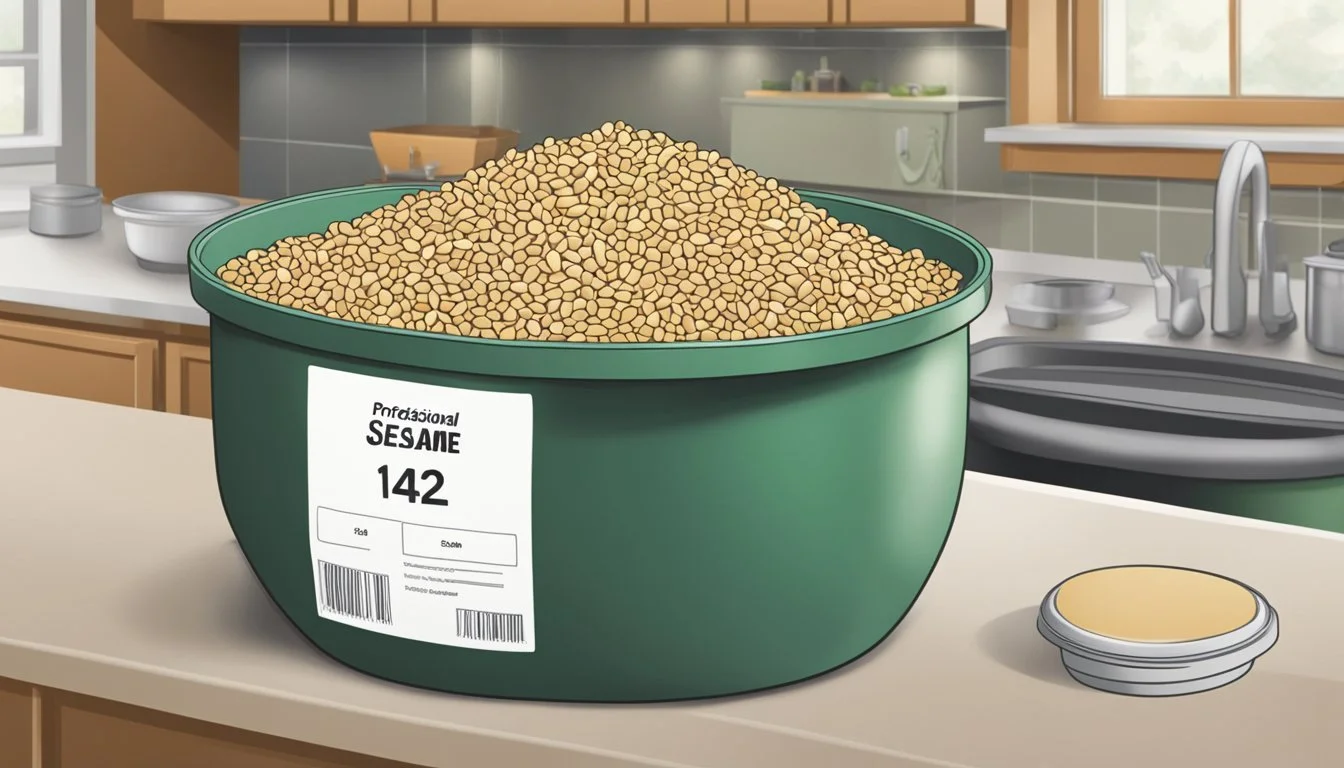Do Sesame Seeds Expire? Essential Facts You Need to Know
Sesame seeds are a staple in many kitchens, offering a delightful crunch and a boost of nutrients. Yes, sesame seeds can expire, though their shelf life varies based on storage conditions. Factors such as whether they are roasted or raw and if they are hulled or unhulled can influence their longevity.
Stored correctly, sesame seeds can last from one to three years, making them a resilient addition to your pantry. Proper storage involves keeping them in a cool, dry place, and preferably in an airtight container to maintain freshness.
When sesame seeds go bad, they often exhibit an off smell or taste. While the expiration date on packaging offers guidance, it does not always dictate safety. Signs of spoilage are a more accurate measure, ensuring that the seeds you use contribute positively to your meals.
Understanding Sesame Seeds
Sesame seeds come in various types and are rich in essential nutrients. They offer numerous health benefits but may also present some risks if not consumed correctly.
Types and Varieties
There are several types of sesame seeds, each with distinct characteristics. White sesame seeds are most commonly used in baking and cooking. Black sesame seeds have a stronger flavor and are often used in Asian cuisine. Golden sesame seeds are known for their aesthetic appeal in gourmet dishes.
These seeds can be consumed in multiple forms: raw, roasted, or toasted. Raw sesame seeds retain their full nutrient profile. Roasted and toasted sesame seeds offer a richer flavor but may lose some nutritional value due to heat.
Composition and Nutrients
Sesame seeds are packed with a wide range of nutrients. They contain significant amounts of healthy fats like omega-6 fatty acids, and are a good source of protein. Essential minerals found in sesame seeds include iron, calcium, and magnesium. They also contain fiber and vitamins such as B1 and E.
The high content of natural oils makes them rich in antioxidants like sesamin and sesamol, which contribute to their health benefits. These antioxidants help in reducing oxidative stress in the body.
Health Benefits and Risks
Sesame seeds provide numerous health benefits. Their antioxidants help reduce inflammation and may lower the risk of chronic diseases. The healthy fats contribute to heart health, while the fiber aids in digestive health. Adding sesame seeds to a diet can improve bone health due to their high calcium content.
Despite these benefits, there are potential risks. Some individuals may experience allergic reactions to sesame seeds. Overconsumption can lead to digestive issues due to their high fiber content. It's also important to properly store them to avoid rancidity, which can cause health problems.
Consuming sesame seeds in moderation and proper storage are key to maximizing their benefits while minimizing risks.
Shelf Life and Freshness
Sesame seeds have varying shelf lives depending on storage methods and whether they are raw or roasted. Identifying signs of freshness and spoilage is crucial for maintaining their optimal taste and nutritional value.
Factors Influencing Shelf Life
The shelf life of sesame seeds is significantly affected by storage conditions. Raw sesame seeds can last up to a year when stored in a cool, dark place. Placing them in the refrigerator can extend this period. Roasted sesame seeds have a shorter shelf life, typically lasting 3 to 6 months in the pantry.
Moisture and sunlight are detrimental to sesame seeds. Exposure to these elements can cause them to spoil faster. Freezing sesame seeds can prolong their freshness up to six months, provided they are stored in airtight containers or freezer bags.
Signs of Freshness and Spoilage
Fresh sesame seeds have a nutty flavor and a pleasant, slightly sweet aroma. As they age or when improperly stored, sesame seeds can develop a rancid odor and a bitter taste. A simple sensory evaluation can help determine their freshness.
Smell: Fresh seeds will smell nutty, while spoiled ones may emit a sour smell.
Taste test: A fresh seed should taste slightly sweet and nutty. If it tastes bitter, it is likely spoiled.
Visual check: Look for changes in color and any signs of moisture which can indicate spoilage.
Expiration and Best By Dates
Sesame seeds usually come with a "best by" date, which is not the same as an expiration date. While they can be consumed past this date, quality may diminish. Tahini, a paste made from sesame seeds, has a shorter shelf life, ranging from 4 to 6 months after the "best by" date if stored properly.
Consumers should always perform a taste test and check for any signs of spoilage before use. It is safe to use sesame seeds after the expiration date, but they may lose freshness and nutty flavor. Proper storage and regular checks ensure that sesame seeds remain a beneficial and delicious addition to meals.
Effective Storage Solutions
Ensuring the longevity of sesame seeds involves maintaining their quality through optimal storage conditions and methods to extend their shelf life. Specific techniques can significantly impact freshness and flavor preservation.
Proper Storage Conditions
Sesame seeds must be stored in a cool, dark, and dry location to maintain their quality. The pantry is an ideal spot as long as it remains dry and free from temperature fluctuations. An airtight container is crucial for preventing moisture and air exposure, which can lead to spoilage and rancidity.
Clear jars are not recommended because light can degrade the seeds over time. Instead, opaque or tinted containers offer better protection. Ensure lids are tight-fitting to minimize air exchange.
For a convenient checklist:
Cool: Avoid direct sunlight and heat.
Dark: Use opaque containers.
Dry: Keep away from damp areas.
Extended Storage Techniques
Freezing sesame seeds is an effective method for prolonging their freshness beyond traditional storage periods. Airtight containers or freezer bags are essential when freezing, as they prevent moisture ingress and freezer burn. Before freezing, make sure to remove as much air from the containers as possible.
Properly frozen sesame seeds can maintain their quality for up to six months. When defrosting, bring them to room temperature gradually to avoid condensation forming inside the container, which could affect their texture and taste.
A step-by-step guide for freezing:
Place seeds in an airtight container or freezer bag.
Remove excess air before sealing.
Store in the freezer for up to six months.
Thaw at room temperature before use.
Using Sesame Seeds in Cooking
Sesame seeds add a nutty flavor and crunchy texture to a variety of dishes. They can be a key ingredient in recipes or used as a garnish to enhance both savory and sweet dishes.
Incorporating into Recipes
Sesame seeds are versatile and can be used in numerous recipes. They can be toasted and sprinkled over salads and stir-fries to add texture and flavor. In baking, sesame seeds can be incorporated into breads, pastries, and cookies, providing a slight nuttiness.
Tahini, a paste made from ground sesame seeds, is essential in Middle Eastern cuisine for dishes like hummus and baba ganoush. Sesame oil, derived from toasted seeds, is another popular ingredient, often used in Asian cooking for its rich, aromatic flavor.
Maintaining Quality in Dishes
To ensure sesame seeds maintain their quality when used in dishes, proper storage is crucial. Storing them in an airtight container in a cool, dark place helps prevent rancidity. Keep them away from light, heat, and moisture to preserve their flavor and crunchiness.
Toasting sesame seeds before use can enhance their nutty aroma and taste. When purchasing sesame seeds, opt for fresh seeds with no signs of spoilage. Check for a consistent color and avoid seeds with an off smell, as these may be past their prime.
In summary, using sesame seeds in cooking can elevate the taste and texture of many dishes. Proper storage and handling ensure they remain safe to eat and flavorful.
Troubleshooting
Proper storage and handling are essential to prolong the shelf life of sesame seeds. This section addresses common issues such as rancidity and contamination, as well as when to discard sesame seeds.
Identifying and Addressing Rancidity
Rancidity is a common issue for sesame seeds due to their high oil content. Signs of rancidity include a bitter taste and an off, unpleasant odor. To check for rancidity, smell and taste a small amount. If they taste or smell off, they are rancid.
To prevent rancidity, store sesame seeds in airtight containers in a cool, dark place. Avoid exposing them to direct sunlight and warm temperatures, as heat accelerates the spoiling process. Freezing sesame seeds can also extend their freshness for up to six months.
Dealing with Contaminants and Bacteria
Contaminants and bacteria are potential hazards for sesame seeds, often due to improper storage. Keep an eye out for mold growth or any unusual appearance. Mold typically manifests as fuzzy spots or a visible change in color.
Store sesame seeds in a dry, clean environment to avoid bacterial contamination. Use dry spoons or scoops to prevent introducing moisture that could promote microbial growth. Check the storage container periodically for any signs of contaminants and transfer to fresh, clean containers if needed.
When to Discard Sesame Seeds
Knowing when sesame seeds are past their prime is crucial for ensuring they are safe to consume. Expired sesame seeds may show signs of spoilage such as rancid smell, bitter taste, or visible mold.
If any of these signs are present, it's best to dispose of the seeds. Even in the absence of spoilage signs, if the seeds emit an off-putting odor or taste, they should be discarded. Regularly inspecting the seeds and their storage containers helps in identifying when they are no longer suitable for use.





